Key takeaways:
- Wildlife conservation involves understanding ecosystems and the importance of every species in maintaining biodiversity.
- Mentorship plays a crucial role in conservation, providing guidance, building confidence, and fostering community among conservationists.
- Networking within conservation can lead to unexpected opportunities and meaningful relationships that enhance professional growth.
- Resilience and active listening are vital lessons learned from mentors, demonstrating that mentorship is a reciprocal relationship that encourages shared growth.
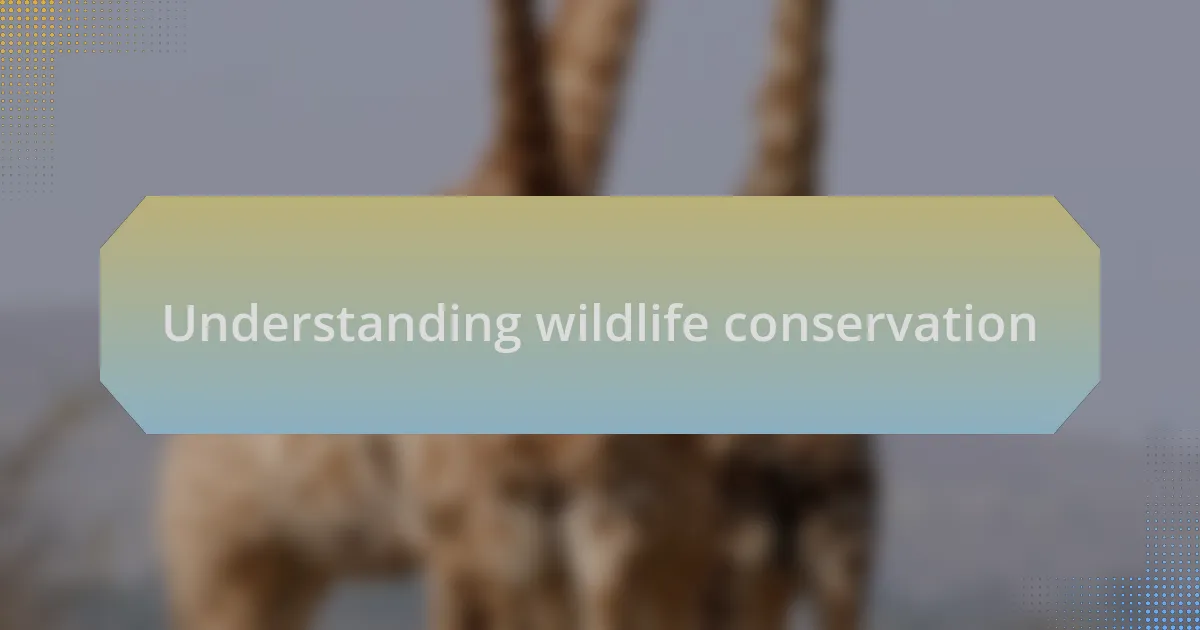
Understanding wildlife conservation
Wildlife conservation is more than just protecting endangered species; it’s about maintaining the intricate web of life that sustains our planet. I remember the first time I saw a majestic elephant in the wild, and the feeling of awe was palpable. It struck me—how could we let such beauty fade into history? This question drives the heart of conservation efforts.
At its core, wildlife conservation involves understanding ecosystems and the delicate balance within them. When I began volunteer work with a local wildlife rescue, I gained insights into how every creature, from the tiniest insect to the largest predator, plays a vital role. Each interaction, whether comforting a frightened animal or participating in habitat restoration, reinforced my belief that preserving biodiversity is crucial for our survival.
I often ponder the impact of our actions on wildlife. Can one person truly make a difference? I have come to realize that even small efforts, like advocating for sustainable practices, contribute to larger conservation goals. It’s inspiring to see that collective action can lead to meaningful change, and I invite you to explore how you can become part of this global movement.
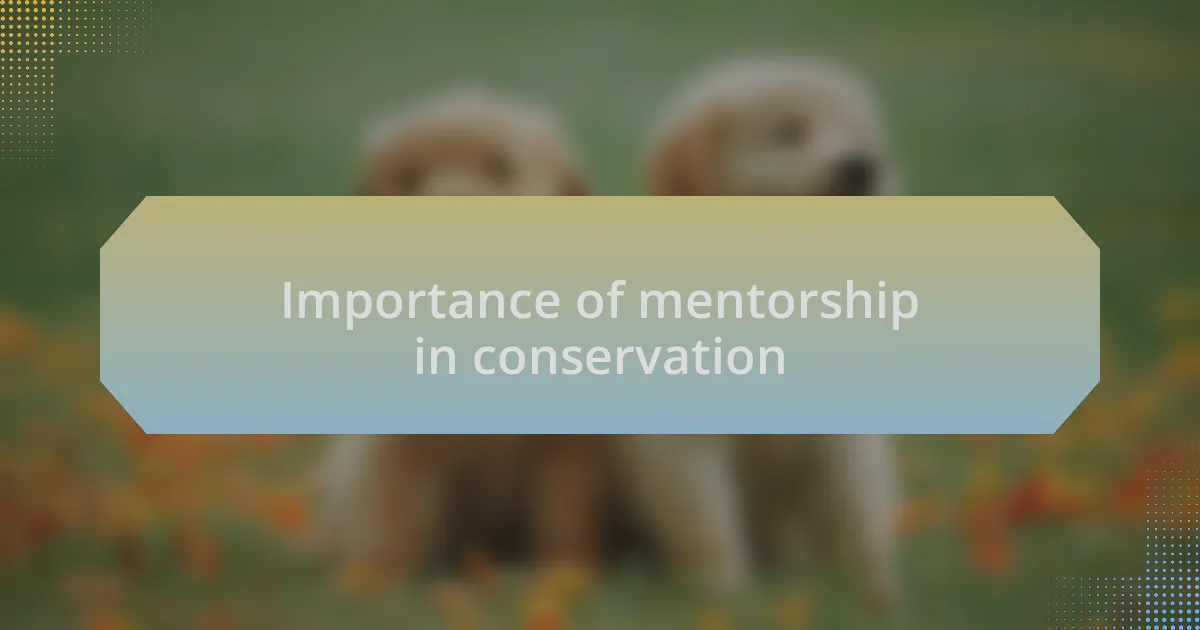
Importance of mentorship in conservation
Mentorship is a cornerstone in the world of conservation. I recall my first experiences with a mentor who guided me through the nuances of habitat restoration. Their patience in explaining the intricate details—like the importance of native plants—opened my eyes to aspects I had never considered. I often think about how much I would have struggled without that guidance and support at the beginning of my journey.
Having a mentor not only imparts knowledge but also builds confidence. I remember feeling overwhelmed during my first wildlife survey, unsure of my skills. My mentor, standing beside me, encouraged me to trust my instincts and educated me on identifying various species. Their belief in my potential pushed me to grow, teaching me that every small contribution matters in the larger tapestry of conservation efforts.
Furthermore, mentorship fosters a sense of community. I have often seen how mentors connect aspiring conservationists with a network of professionals. It’s incredible to think of how those relationships can lead to collaborative projects that might otherwise have remained mere ideas. Don’t you feel that kind of support is vital in a field that often grapples with extensive challenges? Those shared experiences and connections create a ripple effect, enhancing the collective drive towards conservation success.
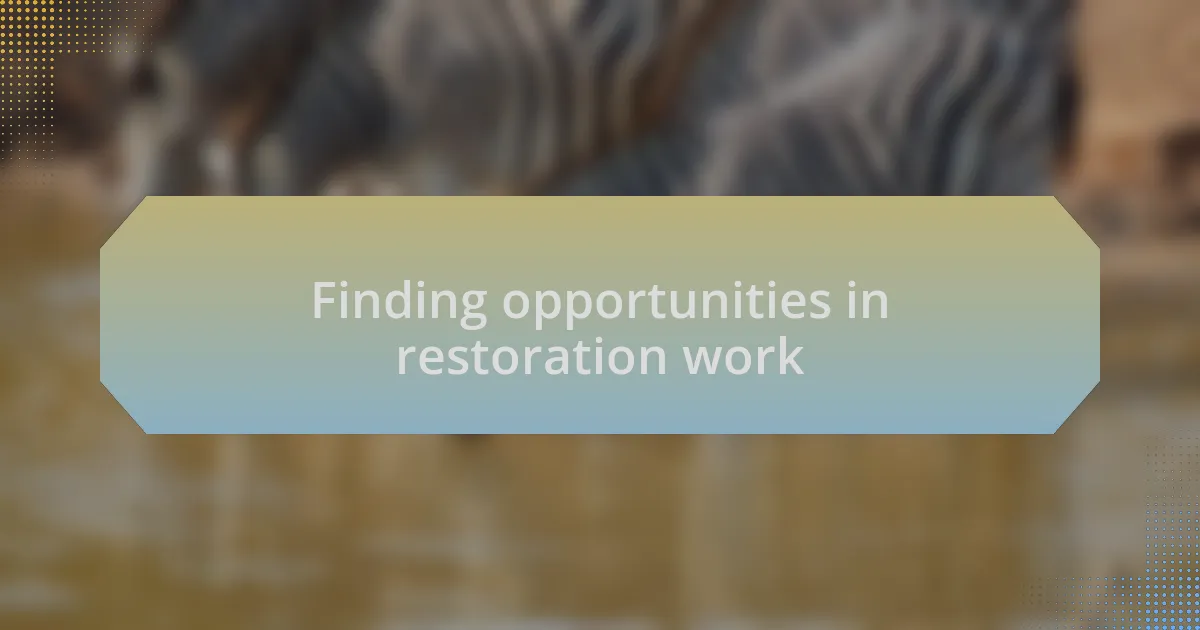
Finding opportunities in restoration work
Finding opportunities in restoration work often begins with immersing yourself in the local community. I recall volunteering with a grassroots organization focused on reforesting a nearby riverbank. It was there that I discovered not only the beauty of hands-on work but also the potential for meaningful connections. Engaging directly with local leaders opened doors to mentorship, leading me to gain insights from seasoned professionals who had spent decades restoring habitats.
Networking is crucial, and sometimes opportunities present themselves in unexpected ways. I once attended a local seminar where I met a speaker who passionately discussed the impact of invasive species on our ecosystems. Their enthusiasm sparked my curiosity, prompting me to approach them afterward. That conversation blossomed into a mentorship, as they kindly offered to guide me through an upcoming restoration project. Have you ever thought about how casual encounters can turn into significant opportunities?
Moreover, staying curious can lead you to uncover exciting projects needing extra hands. When I heard about a coastal erosion restoration effort, I jumped at the chance to join. Through that experience, I not only learned about marine habitats but also formed friendships with individuals who shared my passion. It’s moments like these that highlight the importance of actively seeking out opportunities; you might find a mentor just when you need one.
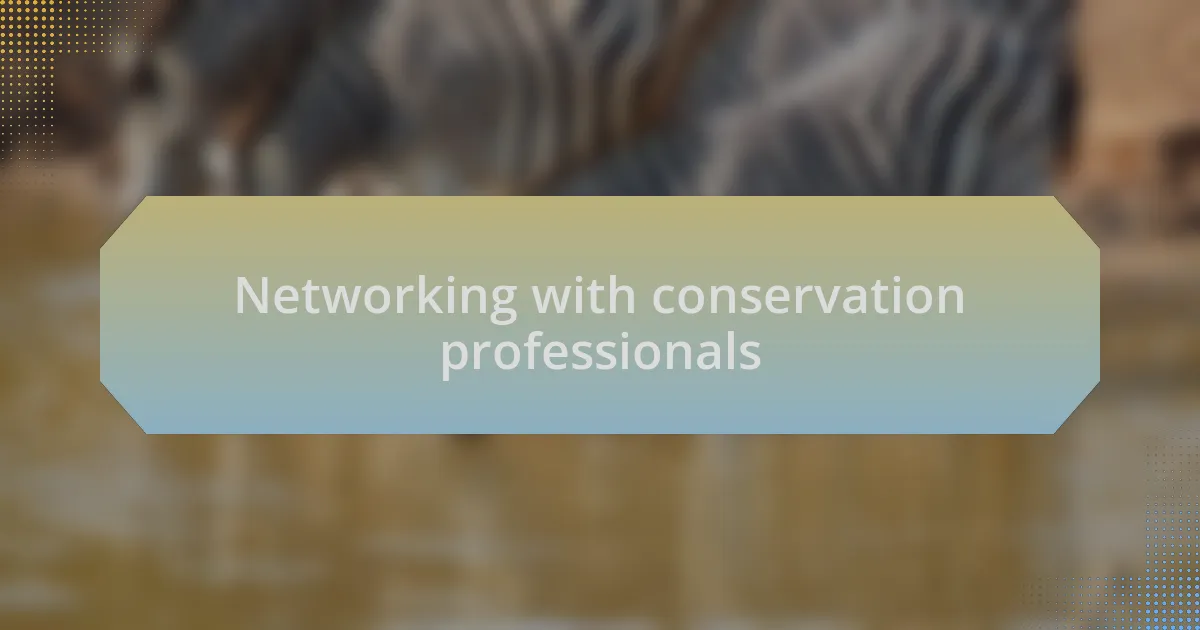
Networking with conservation professionals
Building a network with conservation professionals often requires stepping outside your comfort zone. I remember my first networking event distinctly. It was a bit nerve-wracking, trying to strike up conversations with experts who seemed so far ahead in their careers. Yet, when I approached someone I admired and asked about their journey, I realized they were as eager to share their experiences as I was to learn. That single interaction sparked a friendship and opened the door to mentorship opportunities I hadn’t anticipated.
In my experience, follow-up is key after any networking encounter. I took the time to connect with my newfound contacts through email and social media, sharing updates on my projects and asking for advice on specific challenges I faced. This consistent engagement fostered deeper relationships and led to invitations to field activities and workshops. Have you ever considered how small gestures, like a thoughtful message or sharing an interesting article, can keep those connections alive and thriving?
Lastly, be open to collaboration with various professionals in the field. During a community cleanup initiative, I teamed up with local scientists and educators, blending our efforts for a common cause. Not only did we make a visible impact, but it also allowed me to tap into their knowledge and skills. I often reflect on how these collaborative projects have not only expanded my skill set but have also formed valuable mentorship relationships that continue to guide my journey in wildlife conservation.
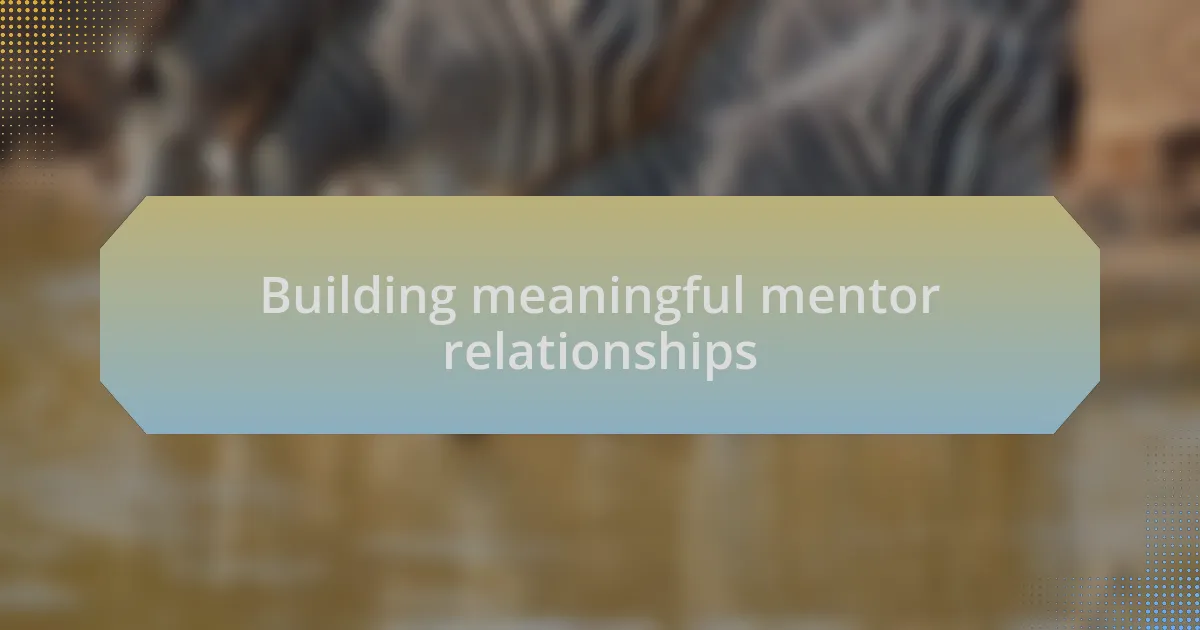
Building meaningful mentor relationships
Building meaningful mentor relationships requires genuine effort and vulnerability. I recall feeling hesitant to share my own challenges with a more experienced colleague, fearing I might be seen as inexperienced. However, when I finally opened up, I was surprised by the warmth of their response; they not only offered guidance but shared stories of their own struggles, creating a sense of camaraderie that laid the foundation for a lasting mentoring bond. Have you ever thought about how much deeper a relationship can become through shared vulnerability?
It’s important to actively nurture these relationships, recognizing that mentorship is a two-way street. I often invite my mentors to join me on field projects, not just as advisors but as collaborators. This engagement turns our discussions into practical experiences, allowing me to learn directly from their expertise while fostering a sense of partnership. I find that when we share mutual goals, it strengthens our connection and intensifies the impact of their guidance.
Listening is another critical element of building these relationships. I remember a time when a mentor pointed out that my inclination to dominate conversations was hindering our connection. Taking their feedback to heart, I started actively listening and asking open-ended questions. This shift not only enhanced my understanding of their insights but also made them feel valued and respected. How often do we take the time to truly listen, and not just hear, what our mentors have to say?
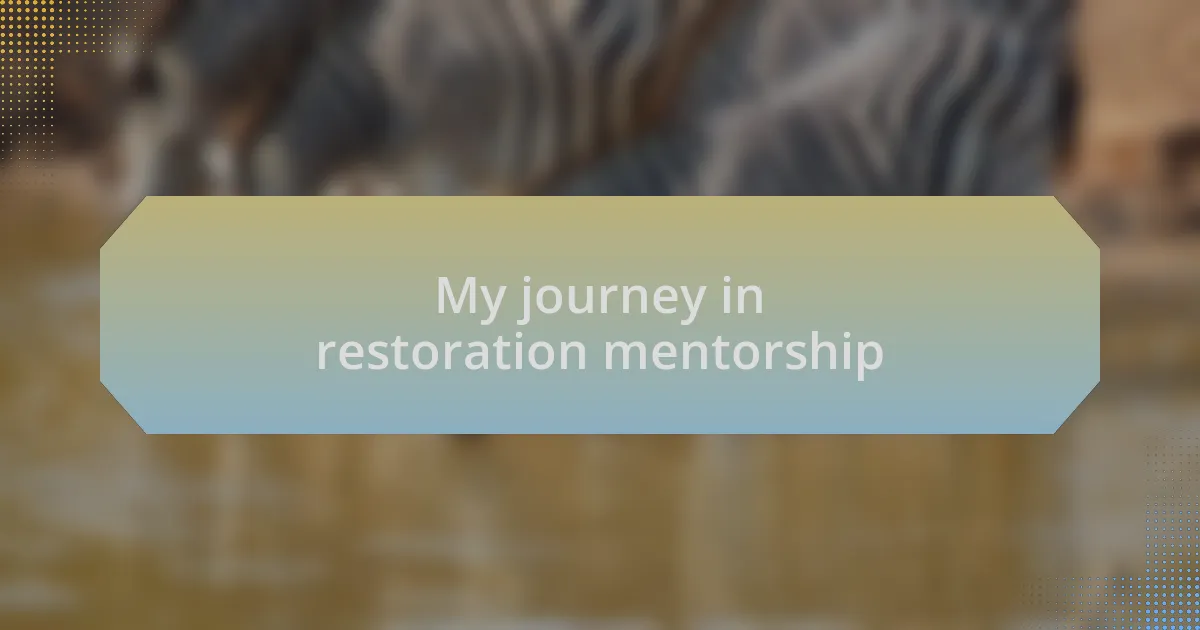
My journey in restoration mentorship
My journey in restoration mentorship
In my early days in restoration work, I felt slightly adrift, uncertain of where to turn for guidance. One evening, while discussing a reforestation project over coffee, a mentor of mine shifted the conversation by asking, “What fears do you hold about your capabilities?” That simple question opened a floodgate of reflection. It was a pivotal moment where I realized that acknowledging my fears was the first step toward genuine growth.
I found that mentorship wasn’t just about technical skills; it was also about understanding the emotional landscape of this work. I remember completing a challenging project, feeling overwhelmed, and reaching out to my mentor for reassurance. Instead of simply praising the outcome, they reminded me that the journey—complete with its emotional highs and lows—was part of my development. It made me think: how much do we appreciate the learning that comes from struggle rather than just success?
As my journey progressed, I made it a point to seek mentors who aligned with my values in wildlife conservation. I specifically sought out a mentor who was passionate about integrating community perspectives in restoration projects. Learning from their approach taught me that mentorship involves more than knowledge transfer; it’s about embracing diverse viewpoints. This experience fostered not just a professional connection but a friendship rooted in our shared love for the environment. Do we recognize the power of those connections in shaping our careers and our impact on conservation?
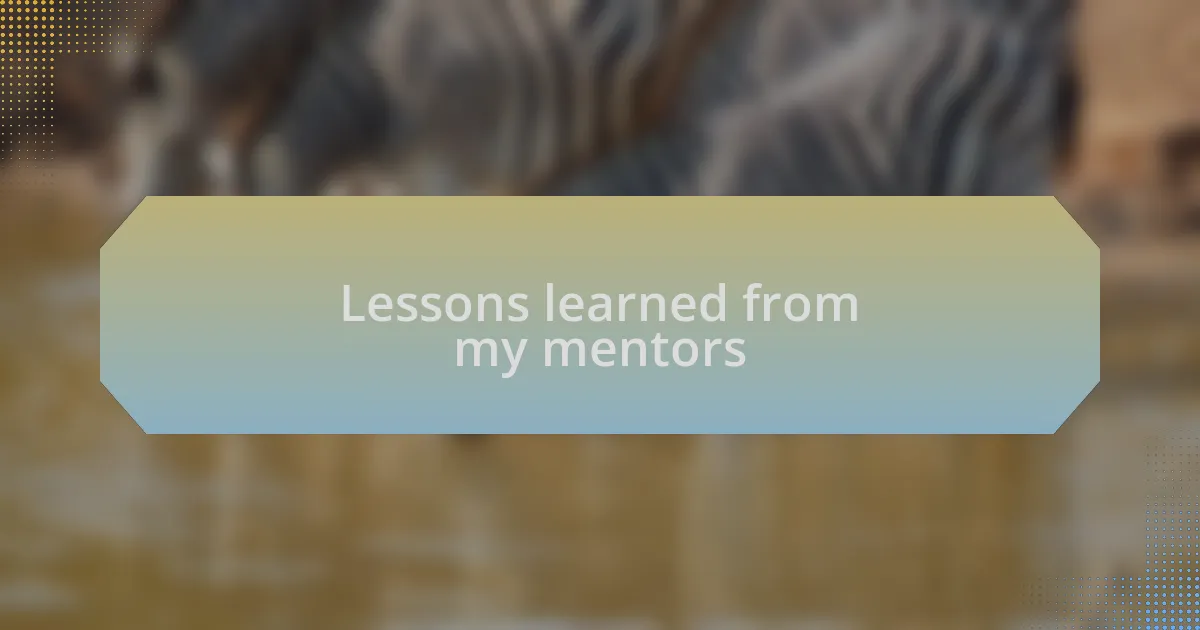
Lessons learned from my mentors
Looking back, one of the most valuable lessons I learned from my mentors was the importance of resilience. During a particularly tough season, when a project faced unexpected setbacks, a mentor shared a personal story of their own failure. They emphasized how each setback became a stepping stone, rather than a stumbling block. This insight made me realize that every challenge is an opportunity for learning and growth.
Another significant lesson came while working on a restoration initiative that required teamwork across different backgrounds. A mentor encouraged me to practice active listening, reinforcing that understanding different perspectives is crucial for success. I once felt frustrated during a group meeting when ideas clashed, but by genuinely listening and valuing others’ input, I noticed how quickly we could find common ground. Have we ever considered how listening can transform conflict into collaboration?
Most importantly, I learned that mentorship is a two-way street. I vividly remember a moment when I shared my research findings with my mentor, and they expressed genuine curiosity about my conclusions. It was a powerful reminder that mentors also grow from their mentees’ insights. In wildlife conservation, fostering this mutual exchange enriches our collective knowledge and strengthens our commitment to the cause. Are we open to learning from those we mentor, recognizing that growth is a shared journey?